- Home
- Adam Thorpe
No Telling Page 20
No Telling Read online
Page 20
The policemen chuckled, each taking one. The three of them were getting on like a house on fire. I could see how my uncle was ‘softening them up’, just as he’d ‘soften up’ managers in the factories and offices. I only knew this because he’d explained it to me; how you had to ‘soften up’ the opposition with jokes that were daring or cheeky, how that made you seem trustworthy – like the joke about the cognac in front of the police.
I saw it in action again when the detective inspector came along a little later, dressed in a sandy-brown suit and a tie like a strip of green neon. He and my uncle walked around the showroom, over its empty lino, standing outside in the cold sunlight by the damaged metal door as if the inspector was a client. I tagged along behind. It excited and frightened me, knowing the truth. The ice in the puddles crunched under our feet, reminding me of the sound that I’d heard in my dream on the night of the robbery, that had woken me up and sent me downstairs for a glass of water, the refrigerator making me jump in the darkness. But I didn’t say anything: the bright green tie made me nervous. Its knot was like an evil alien’s third eye, looking out from the inspector’s throat.
‘Pity you don’t have a dog, so to speak,’ he remarked.
‘The boss of the house doesn’t like dogs,’ my uncle said. ‘Can’t go upsetting the boss of the house, can we?’
The inspector smiled. I couldn’t imagine him with a wife. His sideburns looked stuck on.
‘All electrical goods, was it?’
‘Vacuum cleaners. Industrial.’
‘Hm. My boss of the house could do with one of them,’ the inspector said.
‘Too late.’
The inspector squatted down to look at the damage on the door.
‘Levered it up here with a crowbar just enough to saw through the bolt on the other side, is that right?’
‘Looks like it.’
‘Noisy. Very noisy.’
‘Not if it was sawn through by hand.’
‘A metal workshop the other side there, is it?’
My uncle nodded, blowing smoke out above his head.
‘Work at night, do they?’
‘No.’
The inspector rubbed his nose, thinking.
‘Must have been by hand, then. Slow, but much quieter. Cheeky bastards.’
‘What’s the chance of finding them, then?’
‘The other side of the Spanish border by now. Dissolved in acid, so to speak. Absorbed into the shadows. That’s my opinion.’
‘Bastards.’
My uncle flicked his cigarette onto the hard ground and crushed it with his foot. His eyes met my eyes and fear leapt up into my throat, replacing excitement with something that made my lips go funny.
The thing is, I suddenly knew that he knew that I knew.
I wasn’t quite sure exactly why my uncle had robbed himself in the first place, though, until the insurance man visited. Not the man in the homburg, of course, but a real insurance man. He had a wheeze and a big belly and half-moon glasses and smelt very strongly of sweat. His hand, when I shook it, was damp. He was dressed in a navy-blue suit that showed his dandruff badly and had checked braces to keep his trousers up. He puffed about making notes, examining the damaged door and the plate-glass window and the small dirty window in the back wall.
‘Lucky for you they didn’t come through that,’ he said, looking at the little window. ‘No lock on it, is there?’
‘They couldn’t have done. It was covered up by the boxes.’
‘Never had a lock on, from the looks of it.’
‘Didn’t need to,’ said my uncle. ‘It was blocked by the boxes.’
The man scribbled something in his notebook, nodding all the time.
‘You’d better put a lock on it now. A slim fellow could slip in easily, Monsieur Gobain. Or an urchin. They use kids, y’know, these days. Terrible, the number of burglaries, these days. Never like that when I was a lad. The latest thing is to stage a break-in. A bogus job. Jewellers are fond of that one. We took a jeweller to court last year, very suspicious we were. Big claim, too. Little Jew feller. Opening question of the cross examination, all sneery: “Monsieur, can you really remember the events of fifth February, when you say you were robbed?” Jeweller stares at floor, blinks, judge glaring at him, total silence in court. Then the little Jew bloke nods, tears start to roll down his face – and he ends up practically howling. And that was the end of that, for us. Collapse of case.’
He was looking at my uncle, now, over his half-moon spectacles. My uncle nodded.
‘I don’t blame him,’ he muttered. ‘For getting upset, I mean.’
My uncle was not his normal, booming self with the insurance man; in fact, he did look upset, smoking with trembling hands and answering questions in just a few words, as if too upset to talk more. Perhaps he was, in fact, very worried.
‘And there’s smash-and-grab, too,’ said the insurance man, looking at the plate glass, up and down and side to side, as if trying to decide where to smash it first.
‘We’d hear it,’ said my uncle.
‘And get a bullet through the head? No, prevention’s the key. You want a nice big steel shutter on that. Electric model, slides down at the press of a button.’
‘Cost a fortune,’ said my uncle.
‘Might save you a fortune,’ said the insurance man, making more notes.
I tried to look upset myself, instead of excited.
‘Hear anything, lad?’
The insurance man tapped me on the head with his pen as he asked me. I shook my head, blushing. My uncle had told me to say as little as possible to the insurance man. I hoped the insurance man didn’t think I’d slipped through the dirty little window in the back wall. Anyway, it had been blocked by boxes. That was definitely the truth.
When the crunching noise had invaded my dream in the middle of the night and I’d gone downstairs for a glass of water, I might easily have gone into the showroom. I liked the feel of downstairs in the middle of the night, especially the sitting-room: the dead television, the smell of cigarettes staying in the air, the eerie light from the streetlamp poking through the curtains and making patterns overhead. Because I was hardly ever down there, then, it felt very special. Once I’d secretly pulled on the curtain’s string to increase the light, pretending it was a film. The pulley mechanism got stuck, and nobody could work out in the morning why the curtains were half drawn.
Once or twice I had even looked into the showroom then, just to see how it was in the early hours. Now, of course, it frightened me, thinking of what might have happened if I’d looked in this time, how I might have given them away or been knocked on the head by the iron jemmy. The policemen reckoned, in loud, confident voices, that the jemmy had been left behind the door because the robbers had been disturbed, that one of them had waited there with the jemmy in his hands, ready to knock anyone on the head who came in. I would have had my skull smashed, or at the best been kidnapped for a ransom – and then killed anyway, like ‘little’ eleven-year-old Thierry, whose mother was still waiting for him after five years, even after his remains found in the right white nylon shirt had been buried in the cemetery.
I had seen this on television, in fact, a few weeks before the robbery, and it had impressed me a lot. There were two Thierrys in the big house in Paris, one rich with a chauffeur and the other one poor. The poor one lived up in the attic with his parents; the kidnappers had made a mistake. Since that programme I had started to look out for Thierry when shopping or on my bicycle, forgetting that he would be sixteen by now. His mother was sick with grief, hardly eating or leaving the tiny attic flat, suffering every time another kid got kidnapped or murdered. They interviewed her and her face was as pale and thin as Ste Thérèse’s, or Carole’s in the mental ward. The programme made me think of Carole and Nicolas, in fact – how complicated all our own story seemed compared to the simple story on the television, as simple as one of the old folk tales we would study at school, about peasants and kings a
nd wolves and soldiers with tinderboxes. I began to mix up Thierry’s kidnappers with the showroom robbers, imagining them looking up and seeing me at the showroom door, a question mark and sweat-drops popping up above their heads and then each of them swearing and leaping towards me, their faces masked and their eyes wild, waving jemmies and possibly guns.
What about the man in the homburg hat? Wouldn’t he have forgiven me, if he’d been among them – remembering the Dinky toy?
If I had been kidnapped or bashed on the head, how would my uncle have reacted? Because robbers are robbers, I thought, as I sat in church during Mass a couple of Sundays later. Like whoever had robbed Ste Thérèse of her photographs and replaced them with a zigzag of cardboard panels on aluminium legs. The shiny coloured photos on the panels showed African children and missionaries grinning in front of tractors. The robber was Père Phare, I reckoned. The only picture left of Ste Thérèse was the big one, hidden away in the corner. It was almost as if she’d been kidnapped. The smiling missionaries stood in front of their red tractors. Naked black children with sagging bellies like the insurance man’s laughed at us. Robbers are robbers. Missionaries are missionaries. The two robbers either side of Jesus, for instance: they were bound for Hell, and only one was Saved. My mother was next to me, my uncle next to her. His expression ‘gave nothing away’, as detective stories said. It was difficult to see his face clearly, anyway: it was silhouetted against a lot of offertory candles, moving about in the chilly draughts that the old stove in the aisle couldn’t beat.
My mother’s face, wrapped up like a nun’s in a flowery scarf, was twitching anxiously as the older priest droned on: her spectacles kept moving up and down. Perhaps she knew, too. Or perhaps it was just that we were, in fact, spiralling down and down as the priest said wretched sinners spiralled down into temptation and eternal damnation.
Or perhaps it was just the waiting, the waiting for the news about the insurance money, for Carole to get better, for my uncle to stop smelling of drink. And even that seemed nothing compared to the waiting of Thierry’s mother – whose face had been shown so close on television that the distortion at the corners of the screen had made her look Chinese, her eyes all shiny with grief.
In fact, the insurance company agreed to pay up soon after. A ‘decent sum’, I was told.
I came back from catechism one Saturday afternoon to find my parents giggling in the kitchen with a bottle of champagne and a huge bunch of flowers between them. I was allowed half a glass of champagne. My uncle handed me a square of transparent plastic, folded into three.
‘For your bedroom,’ said my uncle. ‘To celebrate, chum. And for looking after your mother when I was in Nantes. We all deserve a medal, I reckon.’
I thought at first it was a beach ball, when I saw the nozzle. I pumped it up with my uncle’s help and it became an inflatable easy-chair, as light as the air inside it and of the same transparent orange as my usual bubble gum. I carried it up to my room where it took up most of the spare floor. It was quite comfortable, to my surprise, and made my room look up-to-date.
My first thought, though, was to stick a pin in it.
The inflatable chair rocked and made little rude noises as I wriggled. It had a space-age smell, like the interior of the military jet we’d visited in an air-show near Le Bourget. I could lean quite far back or to the side before it started to roll over, and so conducted some amazing manoeuvres in the sky. I was shooting baddies out of the clouds, green aliens with huge foreheads and tiny faces like a newborn baby’s. They were controlling the kind of craft Christophe was so good at drawing. When I tried to think about the robbery and the insurance money, I felt sick.
The next day I watched television with my uncle while my mother was at her fitness club. It was a documentary about a tribe in the jungle. They were dancing up and down and screaming and waving their hands in the air.
‘Oh, look,’ he said. ‘A programme about French youth.’
He was smiling at his own joke. He looked at me and winked and I smiled back at him. I suddenly felt stupid, believing he had robbed himself. The man in the homburg hat must have meant something else when he’d said that it wouldn’t be ‘one-hundred-per-cent quiet’. He was probably talking about putting bars and bolts in: he was, in fact, from the insurance people. It would be very noisy, drilling holes and clattering about with bars and bolts.
My uncle going on about my mother snoring – that had turned foggy in my mind, the words mixing up with other things he’d joke about with clients or friends. The dancers were surrounding a chief with a leopard skin on his shoulders. There were a lot of shiny black backs and the chief waved a stick in the air. The film wasn’t very good quality and this made it more real, somehow. The commentary started to sound funny in my head, although it was a very normal and sensible voice, and my temples began to ache. I had sweat on my forehead and upper lip, as if I was in the jungle. The dancers started to come towards me, waving big feathers and screaming and jumping up and down as if they’d got ants in their pants.
‘You know what?’ said my uncle, watching. ‘I couldn’t care less.’
‘I think I need my migraine pills,’ I said.
It was too late.
Deep in the blackness of my bedroom, I felt a grip on my arm. Someone was prising my head open with a jemmy, but the hinge needed oiling.
‘The excitement,’ my uncle’s voice was saying, echoing like the priest’s in church. ‘Things are going to be all right, now. OK, chum? Fresh start. Fine weather all year round. Right? OK?’
10
My uncle bought a Simca 1100 in the same Burgundy red as my Dinky version. It had a radio in the dashboard. I no longer had to help with the washing-up because a dishwasher did it. It washed dishes completely automatically: I had never seen one before. It was made by a German firm because they were the best. My uncle was always being rude about Germans, as he was about the Arabs and the English and the Communists, but he still bought the dishwasher, saying the Boche at least knew how to make things, they were perfectionists, not like the idle, sloppy, commie-riddled French. I wanted to tell him about the old Gestapo side-car made in Germany, but couldn’t get a word in edgeways. My mother had never imagined having a dishwasher and, anyway, she had read an article in a women’s magazine about detergent residues. My uncle gave her a lecture on the German firm’s reputation, how they made laboratory dishwashers that had been rigorously tested for hygiene by top researchers.
‘We’re not a laboratory,’ said my mother, blinking behind her sewing glasses. Her grey hairs were spreading. ‘Not yet, anyway.’
She adapted to it very quickly. Soon afterwards my uncle did a special deal on a slightly dented electronic tumble-dryer which didn’t need bolting down.
Meanwhile, he was spending weekends sticking squares of rubbery plastic on the hall walls and up the stairs: the plastic was moulded and coloured to look exactly like stonework. This didn’t seem to go with his dream of an aluminium and glass house, but it pleased my mother and made her think of the country. The smell of the glue invaded the whole house and stayed for about a year afterwards. The dishwasher broke down and had to be mended and a glass I’d left on the tumble-dryer quivered off and smashed.
My parents had ‘taken advantage’ of the showroom being stripped to clean it from top to bottom, even the back wall. My uncle first hosed the brick down, then whitewashed it. The dirt was scraped and scrubbed off the small rectangular window and I could see the yard through it, if I stood on a chair. My mother used a strong solution of bleach on the lino and it gleamed right to the four corners, like an ice-rink. When it was dry, I checked whether the black streak near where my father had slipped was still there. It had gone – or at least, I couldn’t find its ghost among the normal grey marks.
The showroom’s swing door was replaced with a stronger one in reinforced steel and an alarm was installed. This meant we didn’t have to put up a huge steel shutter. What was left of Marilyn was painted out and the who
le extension done in pink, like a block of ice cream, with a slash of mint lightning on the side. The plate glass was sudded and swabbed and rubbed by the usual man with the squeegee until the window didn’t seem to be there. And then, on a wet day during the Mardi Gras holidays, just after my thirteenth birthday, the new stock arrived in a massive articulated lorry that chipped the corner of the showroom.
The huge boxes had an English name, Sunburst Inc. Unwrapped, the models looked bigger and tougher than the old ones, as if ready for some really big action, as if their jaws were huge and set tight. Their tubs or ‘drums’ were fatter and of bare stainless steel, a bit like Roman armour. He switched one on and it sounded like a jet fighter.
‘WE’RE GOING TO GO PLACES!’ he yelled, over the noise. ‘WITH THE AMERICANS! NEW HEART, NEW LUNGS! I’VE GOT THE FRANCHISE!’
‘WHAT’S A FRANCHISE?’
‘YOU BUY IT OFF A COMPANY! THE RIGHT TO SELL THEIR PRODUCTS! BUT YOU’RE INDEPENDENT, THAT’S THE THING!’
‘WHAT’S THAT MEAN?’
‘WHAT DOES WHAT MEAN?’
‘INDEPENDENT?’
Our voices were almost hoarse. He switched the vacuum cleaner off and the noise whined into a ringing in my ears.
‘It means I’m still my own boss, chum, and I’m the only one to work the territory. With Sunburst products. It means I’m number one. God bless America, eh?’
He picked up the usual bucket and tipped sand and grit onto the concrete ramp by the new loading door, throwing in a few small stones. Then he held the vacuum cleaner’s head over the mess and I switched on at the wall inside. One by one the bits of grit and the stones sort of twitched and then disappeared up into the head. The circle in the sand got bigger and bigger, making a hole, and soon there was nothing left. The ramp was clean.
‘Suck your eyeballs out,’ he said, grinning, ‘3,200 watts. Detachable filter, automatic water-guard, three-position bristle brush.’
The stock on the back wall wasn’t as high as the stuff that had been stolen: the top row came to just below the little window halfway up the wall. That’s because, my uncle explained, each vacuum cleaner was more expensive. He got a very good margin off each one.

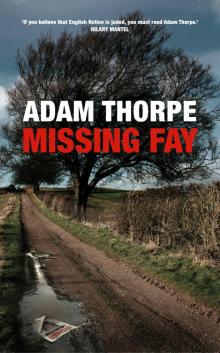 Missing Fay
Missing Fay Hodd
Hodd Pieces of Light
Pieces of Light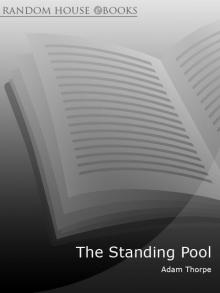 The Standing Pool
The Standing Pool Ulverton
Ulverton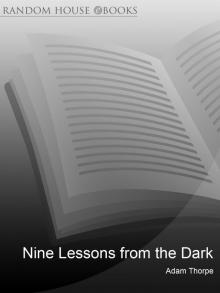 Nine Lessons From the Dark
Nine Lessons From the Dark Flight
Flight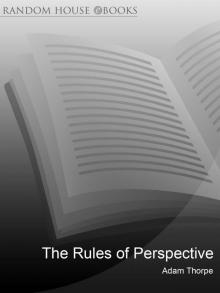 The Rules of Perspective
The Rules of Perspective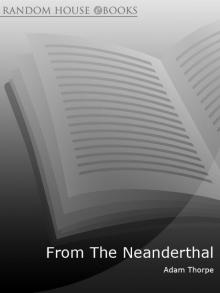 From the Neanderthal
From the Neanderthal Is This the Way You Said?
Is This the Way You Said?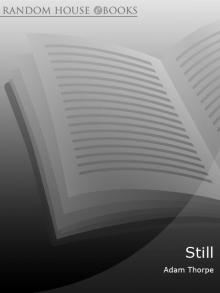 Still
Still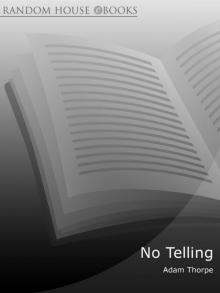 No Telling
No Telling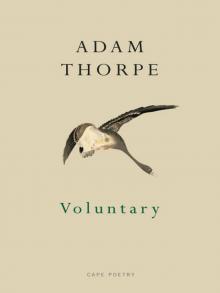 Voluntary
Voluntary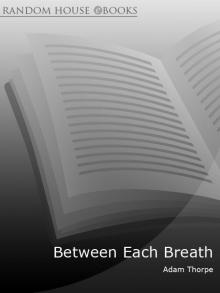 Between Each Breath
Between Each Breath